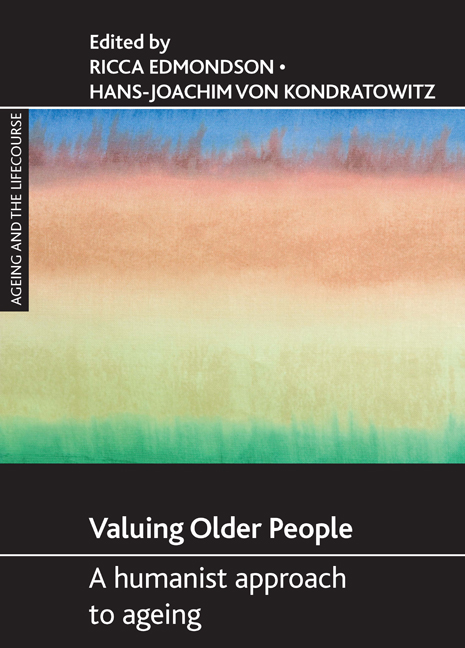Book contents
- Frontmatter
- Contents
- List of tables and figures
- Notes on contributors
- Acknowledgements
- Foreword
- Introduction
- Part One Religion, spirituality, cultural resources and creating meaning
- Part Two Norms, values and gerontology
- Part Three Ageing and wisdom? Conflicts and contested developments
- Afterwords
- Index
- Available titles in the Ageing and the Lifecourse series
two - Spirituality: a means for achieving integration in personal and community spheres in an ageing Singapore
Published online by Cambridge University Press: 05 July 2022
- Frontmatter
- Contents
- List of tables and figures
- Notes on contributors
- Acknowledgements
- Foreword
- Introduction
- Part One Religion, spirituality, cultural resources and creating meaning
- Part Two Norms, values and gerontology
- Part Three Ageing and wisdom? Conflicts and contested developments
- Afterwords
- Index
- Available titles in the Ageing and the Lifecourse series
Summary
Introduction
The search for meaning and purpose in life is far from a speciality of the young; it has been documented as a strong existential and emotional need for older people, especially those who are later in life, 75 years and older. It has been suggested that, within the realm of psychosocial adjustment of those aged 70-84 years, the integrative process plays a critical role. Thus Erikson (1963) postulated eight psychosocial stages of lifespan development, with a focus on the crisis of integrity versus despair at the final stage of life. Since then, many scholars have chosen phenomenological approaches, as well as the social constructionist perspective, to study the ageing process at the micro-level in order to deepen our understanding of the meaning of senescence. The phenomenon of the self (Kaufman, 1986; Sherman, 1991) has been examined in studies and the process of integrating the self in terms of time (past, present and future) as well as space (the various facets of oneself) have been explored. Reker and Wong (1988), Coleman (1990), Sherman (1991) and Tobin (1991) among other researchers have contributed substantially to our understanding of the inner processes that occur within individuals as we age.
Meaning and purpose are intertwined with issues related to spiritual matters and values, and the latter are connected to ethnic norms and beliefs. Hence, in a multicultural and multi-religious society such as Singapore, the journey to study these aspects of ageing inevitably leads one to examine the experiences of older people in the three major ethnic groups: the Chinese, Malay and Indian communities. What can this contrast tell us about different ways in which older people seek, and indeed create, meaning in their lives and those of others?
The Singapore context and this study
Singapore is a natural laboratory for researchers who wish to study cross-cultural and cross-religious social dynamics because it has a multicultural, multilingual and multi-religious population. According to the Census of Population 2000, the three major ethnic groups, the Chinese, Malay and Indian communities, comprised 76.8%, 13.9% and 7.9% of the total population respectively (Census of Population, 2001: 4). The religions that are practised correlate closely with ethnic distribution.
- Type
- Chapter
- Information
- Valuing Older PeopleA Humanist Approach to Ageing, pp. 37 - 50Publisher: Bristol University PressPrint publication year: 2009



